Uganda is currently experiencing rapid urbanization estimated at 20% and by 2050 will be among the most urbanized countries in Africa (GoU, 2017). In Uganda, urbanization has been looked at as a prerequisite for the country to achieve upper- middle income status as part of achieving vision 2040. Despite the benefits being experienced from the current urbanization, Uganda’s urbanization still faces many challenges some of which are, slum and informal settlements, poor solid waste management, deteriorating urban environment, a weak urban economy and an urban sprawl. It’s upon this background that the National Planning Authority, GGGI, Ministry of Local Government and the Ministry of Lands, Housing and Urban Development have embarked on a mission to ensure that Uganda achieves strong, inclusive and sustainable economic growth in her urbanization process by providing solutions to the challenges mentioned above through the Greening Uganda’s Urbanization and Industrialization Project.
Starting 3rd May to 6th, GGGI Uganda embarked on a series of induction workshops for the different newly elected city leaders where the Greening Uganda’s Urbanization and Industrialization project is being implemented. The objective of the workshops was to introduce the newly elected leaders to the greening of cities, integrating the greening agenda into the cities and also, introducing the Greening Uganda’s Urbanization and Industrialization project to the beneficiaries. The facilitating teams for the induction workshops were from the National Planning Authority, GGGI, Ministry of Local Government and the Ministry of Lands, Housing and Urban Development.
The induction workshops were opened by the City Mayors of the respective districts of Gulu, Arua, Jinja, Soroti and Mbarara. It was during one of these workshops, where Soroti City Mayor Mr. Paul Omer thanked his colleagues for taking time off to attend this workshop that is geared towards seeing cities with clean water, proper solid waste management, and greened cities. He commended GGGI on its efforts towards greening of these cities. He further thanked the National Planning Authority and the European Union for mobilizing and coordinating the different arms to see a better Uganda.
He mentioned that this engagement was timely and pledged that his team would work closely with GGGI to ensure that the Soroti people benefit from all the different interventions by the project.
To add to his voice one of the elders, Ms. Toto, emphasized that they, being the pioneers of the cities, there was need for the teams to work together. She called on the councilors to put aside their political differences and focus on the development of the cities. She also mentioned that the teams should work hard to at least leave solid evidence of their tenure in office at the end of the 5 years.
Some of the highlights from the project team’s presentation by Ron McGill, the project team leader, included the need for an integrated development strategy for the councilors. He stressed the central point that Uganda’s new cities are the local development engines for growth. He noted that there was need for the Local Governments to appreciate the transition process to the National Development Plan III. He emphasized that city councilors retain the holistic perspective of the cities, which helps temper the sectoral concerns of the national government.
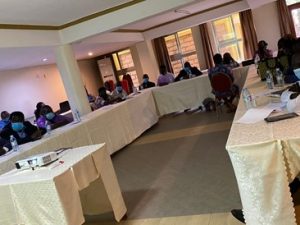
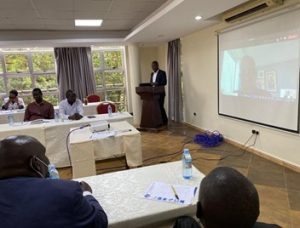
The GGGI team also put emphasis on the possibility of relocating some industrial functions from the cities to the Industrial Parks. Other opportunities included establishing shared facilities and structures such as organic waste and waste water plants, widening roads in the parks and linking them to the cities and also the harnessing of skills as possibilities geared towards greening the city. All these interventions if put in place will drive the greening agenda forward.
Urban areas in Uganda play a significant role in driving economic growth. More than 70 percent of non-agricultural economic activity and non-agricultural jobs are located in urban areas. Urban areas are leading the process of transformation away from agriculture, resulting in improved socio-economic conditions for urban dwellers. The typical Ugandan city has grown rapidly but without sufficient policy coordination. As a result, the emergence of new cities has not necessarily resulted in increased productivity, the living environment hasn’t provided for decent housing and the mobility of people and goods is constrained and costly due to the heavy traffic congestion in the cities.
Some of the different concerns raised by the officials from the different local councils included the cutting of roads that has left potholes in most cities by some national government agencies. Other concerns are reluctance on availing land for such interventions, solid waste management initiatives that have been cramped by directives straining the use of revenue collected by the councils. This has led to the underfunding of the council activities such as waste management.
The National Planning Authority put emphasis on the third National Development Plan (NDPIII), 2020/21-24/25. This identifies industrialization and urbanization among the key components to be harnessed to achieve the desired economic transformation. They further informed the team that the government is aiming at working towards creating employment for the current population and at the same time achieving economic transformation and development by 2040. Thus, the need is to implement such a Green Urbanization and Industrialization project that aims to promote sustainable development and inclusive green growth in Uganda by focusing on green city development, green industrialization, efficient waste management and green growth integration into planning and budgeting. This is to ensure that Uganda is achieving maximum benefits from a green growth pathway.
The Local government teams requested the GGGI team and the National Planning Authority to regularly engage the Local Government teams in such workshops so as keep them on track. Cities will then benefit massively from these initiatives that are really needed. The facilitating teams promised continued support towards achieving the green pathway for the cities.
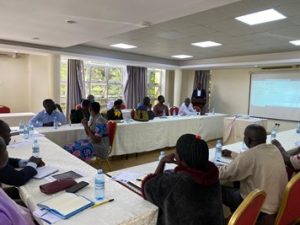
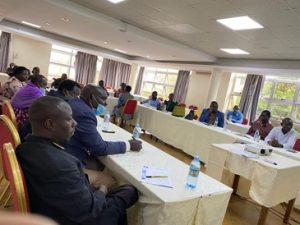
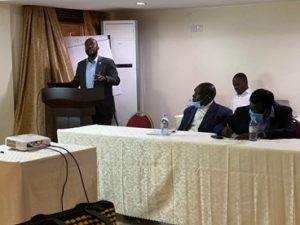

T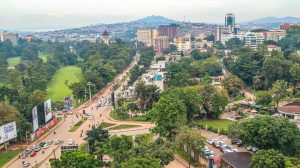
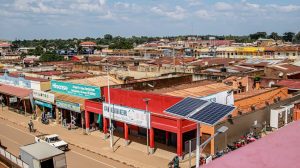
The Local government teams requested the GGGI team and the National Planning Authority to regularly engage the teams in such workshops and keep them on track so that their cities benefit massively from these initiatives that are needed to which the facilitating teams promised continued support towards the green pathway for the cities.